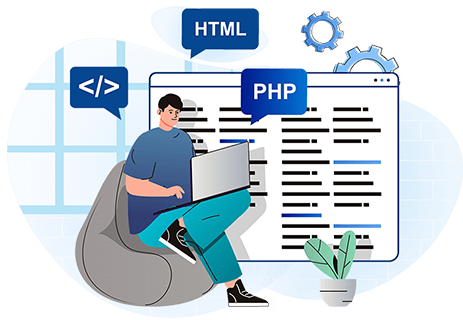Experience Seamless Development with
CORE PHP
Transform your digital presence with Alopna. Let us help you create a user experience that delights and retains users, while driving growth and brand loyalty.
Core PHP
The core features and capabilities of PHP, the popular open-source programming language mainly used for web development, are referred to as Core PHP. By directly embedding scripts in HTML, establishing connections to databases, processing forms, controlling sessions, and much more, it lets developers create dynamic web sites. Since Core PHP doesn't rely on third-party libraries or frameworks (like Laravel or CodeIgniter), developers have complete control over every part of the code.
The core features and capabilities of PHP, the popular open-source programming language mainly used for web development, are referred to as Core PHP. By directly embedding scripts in HTML, establishing connections to databases, processing forms, controlling sessions, and much more, it lets developers create dynamic web sites. Since Core PHP doesn't rely on third-party libraries or frameworks (like Laravel or CodeIgniter), developers have complete control over every part of the code.

Core Pages in a Website
Homepage
Role: serves as the gateway and gives a synopsis of the goals, products, and special value of the website.
Functionality: highlights the main material, provides navigation to key sections, introduces the brand, and frequently incorporates calls-to-action to help users.
About Page
Role: builds visitors' trust by providing them with information about the business, its team, mission, and values.
Functionality: demonstrates expertise, builds credibility, and tells the brand's story to help users engage with it.
Products or Services Page
Role: gives consumers comprehensive details about the company's offerings so they may become more knowledgeable about each good or service.
Functionality: Breaks down offerings into categories, highlights features and benefits, and includes call-to-action buttons for further engagement or purchase.
Contact Page
Role: displays call-to-action buttons for additional interaction or purchase, highlights features and benefits, and divides offerings into categories.
Functionality: Makes it simple for visitors to get in touch by providing contact forms, email addresses, phone numbers, physical locations, and social media links.
FAQ Page
Role: provides answers to frequently asked questions, which lowers support inquiries and raises customer happiness.
Functionality: provides consumers with rapid solutions to their problems by arranging answers to often asked inquiries in an approachable manner.
Blog or Resource Page
Role: offers insightful industry-related content that increases engagement and boosts SEO by focusing on pertinent keywords.
Functionality: hosts multimedia information, guides, or stories that inform visitors, position the brand as an authority, and attract natural traffic.
Privacy Policy and Terms of Service Pages
Role: Describe the website's user agreements and data handling rules, which are essential for legal compliance.
Functionality: ensures openness and legal protection by outlining data gathering, usage procedures, and user expectations.
Why Core Pages Are Essential
Core pages are key to a well-functioning website. Let’s explore how they improve the user experience, SEO, and conversions.
User Experience
Easy navigation and well-structured core pages enhance the user journey, making it seamless and intuitive.
SEO & Discoverability
Optimized core pages increase your website’s visibility, improving search engine rankings and discoverability.
Conversion & Engagement
Well-placed CTAs and engaging content drive conversions and enhance user interaction with your site.
Inquery
Get In Touch
Get in touch
 alopnasoftware@gmail.com
alopnasoftware@gmail.com
 +91-7239966066
+91-7239966066
 support@alopna.com
support@alopna.com
 +91-7239966066
+91-7239966066